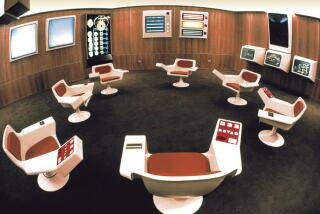So, who really did invent the Internet?
Gordon Crovitz of the Wall Street Journal’s editorial page reopens the ancient debate over who invented the Internet with a column Monday calling out the notion that it was the government as an “urban legend.”
And while I’m gratified in a sense that he cites my book about Xerox PARC, “Dealers of Lightning,” to support his case, it’s my duty to point out that he’s wrong. My book bolsters, not contradicts, the argument that the Internet had its roots in the ARPANet, a government project. So let’s look at where Crovitz goes awry.
First, he quotes Robert Taylor, who funded the ARPANet as a top official at the Pentagon’s Advanced Research Projects Agency, or ARPA, as stating, “The Arpanet was not an Internet. An Internet is a connection between two or more computer networks.” (Taylor eventually moved to Xerox’s Palo Alto Research Center, where he oversaw the invention of the personal computer, and continued promoting research into networking.)
But Crovitz confuses AN internet with THE Internet. Taylor was citing a technical definition of “internet” in his statement. But I know Bob Taylor, Bob Taylor is a friend of mine, and I think I can say without fear of contradiction that he fully endorses the idea as a point of personal pride that the government-funded ARPANet was very much the precursor of the Internet as we know it today. Nor was ARPA’s support “modest,” as Crovitz contends. It was full-throated and total. Bob Taylor was the single most important figure in the history of the Internet, and he holds that stature because of his government role.
Crovitz then points out that TCP/IP, the fundamental communications protocol of the Internet, was invented by Vinton Cerf (though he fails to mention Cerf’s partner, Robert Kahn). He points out that Tim Berners-Lee “gets credit for hyperlinks.”
Lots of problems here. Cerf and Kahn did develop TCP/IP--on a government contract! And Berners-Lee doesn’t get credit for hyperlinks--that belongs to Doug Engelbart of Stanford Research Institute, who showed them off in a legendary 1968 demo you can see here. Berners-Lee invented the World Wide Web--and he did so at CERN, a European government consortium.
Cerf, by the way, wrote in 2009 that the ARPANet, on which he worked, “led, ultimately, to the Internet.”
As for Ethernet, which Bob Metcalfe and David Boggs invented at PARC (under Taylor’s watchful eye), that’s by no means a precursor of the Internet, as Crovitz contends. It was, and is, a protocol for interconnecting computers and linking them to outside networks--such as the Internet. And Metcalfe drew his inspiration for the technology from ALOHANet, an ARPA-funded project at the University of Hawaii.
So the bottom line is that the Internet as we know it was indeed born as a government project. In fact, without ARPA and Bob Taylor, it could not have come into existence. Private enterprise had no interest in something so visionary and complex, with questionable commercial opportunities. Indeed, the private corporation that then owned monopoly control over America’s communications network, AT&T;, fought tooth and nail against the ARPANet. Luckily for us, a far-sighted government agency prevailed.
It’s true that the Internet took off after it was privatized in 1995. But to be privatized, first you have to be government-owned. It’s another testament to people often demeaned as “government bureaucrats” that they saw that the moment had come to set their child free.
ALSO:
A tech guru’s dissent on Steve Jobs
More to Read
Inside the business of entertainment
The Wide Shot brings you news, analysis and insights on everything from streaming wars to production — and what it all means for the future.
You may occasionally receive promotional content from the Los Angeles Times.










